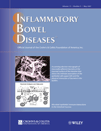Multidrug resistance 1 gene polymorphism and susceptibility to inflammatory bowel disease
Abstract
Background: Several studies have evaluated the role of the multidrug resistance 1 gene (MDR1) polymorphism, which encodes the membrane-bound efflux transporter P-glycoprotein 170, in determining susceptibility to and disease behavior in inflammatory bowel disease (IBD), but with conflicting results.
Methods: A total of 211 patients with Crohn's disease (CD), 97 patients with ulcerative colitis (UC), and 212 control subjects were investigated for the presence of MDR1 G2677T/A and C3435T polymorphisms. Genotype frequencies of CD and UC patients were compared to those observed in a control population. Genotype–phenotype correlations with major clinical features were also established and estimated risks (odds ratio [OR] with 95% confidence interval [CI]) for the mutations were calculated by a logistic regression analysis and multiple correspondent analysis.
Results: No significant difference was observed for genotype frequencies for both MDR1 G2677T/A and C3435T polymorphisms on overall disease susceptibility for either CD or UC patients compared with control subjects. A significant association was found between the MDR1 C3435T polymorphism and patients with ileo-colonic CD (OR = 3.34; 95% CI: 1.34–8.27). Interestingly, a negative association was found between MDR1 C3435T polymorphism in patients with a positive family history for IBD (OR = 0.44; 95% CI: 0.20–0.95) and articular manifestations (OR = 0.29; 95% CI: 0.13–0.68). Both susceptible and protective effects were identified. No significant association between G2677T/A polymorphism and any specific subphenotypes was found, nor was there any association with subphenotypic categories of UC and both single nucleotide polymorphisms.
Conclusions: The results of our study suggest that MDR1 gene polymorphism could have a role in determining susceptibility to IBD. The variability of this possible effect in the several studies reported so far may be the indirect expression of the complex role played by the MDR1 gene and its product, P-glycoprotein 170, in the regulation of host–bacteria interactions and in the pathogenesis of IBD.
(Inflamm Bowel Dis 2007)




